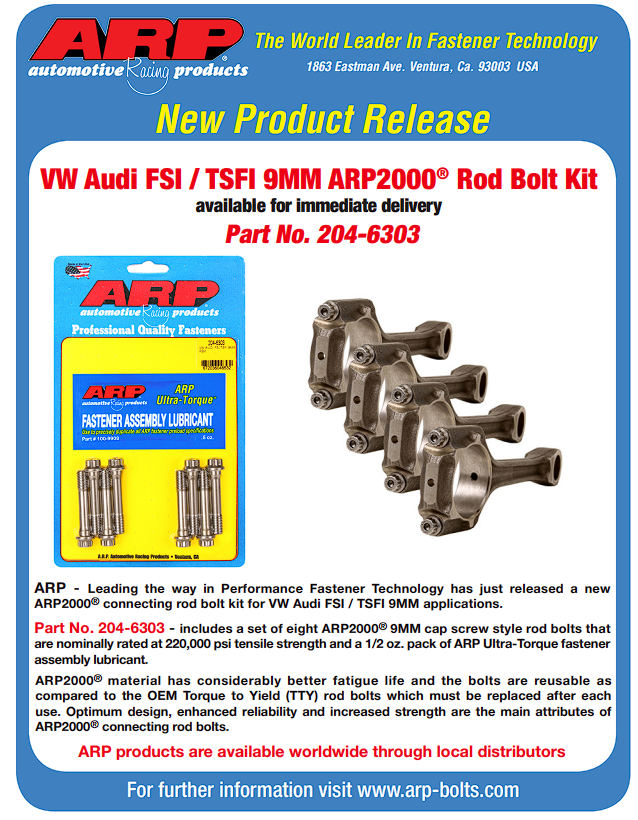

ARP 204-6303 Rod Bolt Kit for Volkswagen/Audi FSI/TFSI. M9
This item is considered special order and is not available for immediate pickup or dispatch. Price and ETA may vary. Please note that no returns, cancellations, or refunds allowed on special orders.
ARP 204-6303 Rod Bolt Kit for Volkswagen/Audi FSI/TFSI. M9
ATOMIC-SHOP UAE
26th Street - Al Quoz Industrial Area 2
Dubai DU
United Arab Emirates
ATOMIC-SHOP UAE (RABDAN Motorsport)
14 10b St - Al Quoz Industrial Area 3
Dubai DU
United Arab Emirates
Choose options
This item is considered special order and is not available for immediate pickup or dispatch. Price and ETA may vary. Please note that no returns, cancellations, or refunds allowed on special orders.
This item is considered special order and is not available for immediate pickup or dispatch. Price and ETA may vary. Please note that no returns, cancellations, or refunds allowed on special orders.
A large number of connecting rod manufacturers have chosen ARP bolts as standard equipment. They’re proud to advertise their products as being equipped with ARP rod bolts. And for good reason. The “weak link” in a connecting rod has always been the bolt, and racers know that nobody builds a better bolt than ARP. However, it is critically important to monitor the stretch of each bolt and replace it when it has permanently elongated by .0005?. Below you will find an extensive listing of aftermarket connecting rods and replacement bolt specifications.
In some instances, you may want to go to an ARP rod bolt made from a better grade of material. This will provide you with improved reliability. However, please understand that when you want bolts made from exotic, super high strength materials, the cost will increase significantly. If you’re on a budget, it’s best to go with the most cost-effective solution. This is typically defined by the loads that are carried by the bolts in terms of piston/rod weight and the rotational speed of the engine. The most cost effective design is the one in which the bolt strength is just great enough to handle its anticipated load – plus a safety margin for the occasional overloads. Using a material which has far more strength than required is not as cost effective – but will definitely give you an extra margin of safety and longer service life.
You should also know that ARP rod bolts are superior to those from other manufacturers. Especially in the area of fatigue strength. Testing has shown ARP rod bolts to have ten times the fatigue strength of other bolts. In the chart below, you’ll find a bar chart that graphically shows the difference between ARP Pro Series rod bolts and the fastener made by a leading competitor. It’s easy to see why ARP bolts are superior. As such, it makes good sense to rely on ARP for optimum connecting rod service and reliability. Make the most of your racing budget and rely on ARP rod bolts. You’ll find the ARP name proudly stamped on each bolt as your assurance of quality.
Features:
- Forged in-house at ARP using only the finest quality materials
- Heat-treated using special vertical racks to assure complete 360° penetration
- Threads rolled after heat-treat to provide up to 10-times longer fatigue strength
- Precision CNC-machined to exacting specifications
- Specially designed for optimum reliability in each application
Wave-Loc Features:
- Wave-Loc surface contacts the rod and cap for optimum alignment and reduction of fluctuating stress – which strengthens the rod itself!
- Provides snug fit for all OEM connecting rods (interference range of .001? to .005?), despite wide range of factory rod bolt hole tolerances.
- Available for most applications.
- Superior material grain flow because of patented Wave-Loc surface design as compared to knurled bolts that have sharp edges and “built-in” stress risers.
- Galling and scoring of the rod is virtually eliminated because there is only smooth contact and absolutely no “digging.”
Materials Used In ARP Connecting Rod Bolts:
- 8740 CHROME MOLY: Until the development of today’s modern alloys, chrome moly was popularly considered a high strength material. Now viewed as only moderate strength, 8740 chrome moly is seen as a good tough steel, with adequate fatigue properties for most racing applications, but only if the threads are rolled after heat-treatment, as is the standard ARP production practice. Typically, chrome moly is classified as a quench and temper steel, that can be heat-treated to deliver tensile strengths between 180, 000 and 210, 000 psi.
- AERMET: With a typical tensile strength of 290, 000-310, 000 psi, Aermet is a new martensitic super-alloy that is stronger and less expensive than the super-alloy austenitic materials that follow. Because it is capable of achieving incredibly high clamping loads, it is ideal for short but extreme environments like top fuel, funny car and some short track applications. Although Aermet is a maraging steel that is far superior to other high strength steels in its resistance to stress corrosion, it must be kept well-oiled and not exposed to moisture.
- ARP2000: ARP2000 is an alloy steel that can be safely heat treated to a higher level, producing a greater strength material than 8740. While 8740 and ARP2000 share similar characteristics – ARP2000 is capable of achieving a clamp load at 220, 000 psi. ARP2000 is used widely in short track and drag racing as an up-grade from 8740 chrome moly in both steel and aluminum rods. Stress corrosion and hydrogen embrittlement are typically not a problem, providing care is taken during installation.
- L19: This is a premium steel that is processed to deliver superior strength and fatigue properties. L19 is a very high strength material compared to 8740 and ARP2000 and is capable of delivering a clamp load at 260, 000 psi. It is primarily used in short track and drag racing applications where inertia loads exceed the clamping capability of ARP2000. Like most high strength, quench and temper steels – L19 requires special care during manufacturing to avoid hydrogen embrittlement. This material is easily contaminated and subject to stress corrosion. It must be kept well-oiled and not exposed to moisture.
- INCONEL 718: A nickel based material that is in the high temperature, super-alloy class, it is found to be equally suitable in lower temperature applications. This material delivers tensile strengths in the 210, 000-230, 000 psi range and exhibits improved fatigue properties. Best of all, Inconel 718 is completely immune to hydrogen embrittlement and corrosion.
- ARP3.5 (AMS5844): While similar to Inconel 718, these superalloys are found in many jet engine and aerospace applications where heat and stress attack the life of critical components. The high cobalt content of this alloy, while expensive, delivers a material with superior fatigue characteristics and typically tensile strength in the 260, 000-280, 000 psi range. The immunity to hydrogen embrittlement and corrosion of these materials is a significant design consideration. These materials are primarily used in connecting rods where extremely high loads, high RPM and endurance are important factors – Formula 1, NASCAR and IRL applications.
- CUSTOM AGE 625 PLUS: This newly formulated super-alloy demonstrates superior fatigue cycle life, tensile strength and toughness – with complete resistance to atmospheric corrosion and oxidation. ARP is the first to develop manufacturing and testing processes for fasteners with Custom Age 625+. Best of all it is less expensive and expected to soon replace MP-35 as the material of choice in the high strength, super-alloy field. Typical tensile strength is 260, 000-280, 000 psi.
| Specifications | |
|---|---|
| Socket Size(s) | 10mm 12pt |
Features:
Perfect for upgrading your fuel injection system
Made with the use of the highest quality materials
Modern technology for uncompromising reliability
Proven to deliver unmatched performance and strength
Will provide dependable operation for years to come.
Fits Following Engines:Volkswagen/Audi FSI/TFSI

